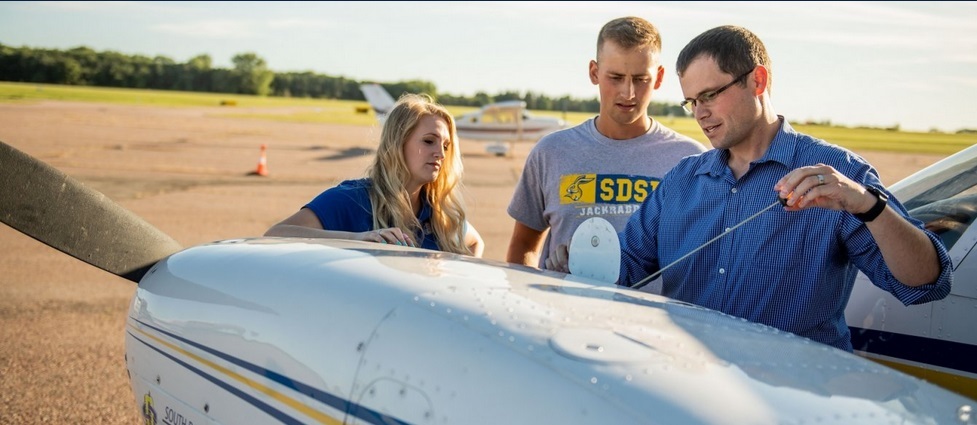| |
Jan 31, 2026
|
|
|
|
|
2024-2025 Undergraduate Catalog [Archived Catalog]
Aviation (B.S.) - Aviation Education Specialization
|
|

 
%20-%20Aviation%20Education%20Specialization.png)
Program Coordinator/Contact
Maria Julius, Instructor
School of Health and Human Sciences
Wagner Hall 425, Box 2275A
605-688-5161
Program Information
The Aviation Education Specialization is for students who wish to become Certified Flight Instructors and later be professional pilots in industry. Many of our graduates are in the airlines, military, government, and corporate workplaces. Top performing students of this option are often brought on as flight instructors in the SDSU program during their junior and senior years.
Accreditation, Certification and Licensure
Accreditation
The Aviation (B.S.) – Education Specialization is accredited by the Aviation Accreditation Board International (AABI).
Course Delivery Formats
Aviation students learn through lecture, laboratory, student lead instruction, and flight training based at the Brookings Regional Airport. For more information regarding required flight charges please access www.sdstate.edu/school-health-human-sciences/sdsu-aviation-required-flight-charges.
|
Academic Requirements
A grade of C or better is required in all AVIA prefix courses to count towards graduation with the major. A grade of D in any AVIA prefix course cannot be counted and must be repeated to graduate with the major. Students will not be allowed to continue in the Aviation program if they have received a failing or D grade in any one AVIA course two times. Students will be required to produce documentation of a completed FAA Medical Certificate (1st or 2nd Class) from a recognized aviation medical examiner prior to beginning flight course AVIA 171. Enrollment caps for aviation flight courses are implemented to safeguard the quality of education, ensure safety standards, and comply with accreditation guidelines. Enrollment in AVIA prefix courses are on a first come first serve basis for students who fully meet any course prerequisites. Requirements for Aviation Major - Aviation Education Specialization: 120 Credits
Bachelor of Science System General Education Requirements
College of Education and Human Sciences Requirements
Electives
Taken as needed to complete any additional degree requirements. Total Required Credits: 120
Summary of Program Requirements
Bachelor of Science | | System General Education Requirements* | 32 Credit Hours | | College of Education and Human Sciences Requirements | 4 Credit Hours | | Major Requirements | 61 Credit Hours | | Supporting Coursework | 6 Credit Hours | | Electives** | 17 Credit Hours | *System General Education Requirements for students pursuing a baccalaureate degree shall include a minimum of 30 credit hours. Some general education coursework may be counted for Major Requirements and Supporting Coursework.
**Taken as needed to complete any additional degree requirements. Academic Advising Guide Sheet
The goal of the academic advising guide sheets and sample plans of study is to promote undergraduate student success by guiding all students to timely completion of an undergraduate degree. Students are not limited to the course sequence provided for their academic program. Instead, the sample plan of study is one possible path to completing your degree and is meant to be used as a guide for planning purposes in consultation with an academic advisor. The plans also help students prepare for meetings with their academic advisor and track their progress in their selected academic program. |
|
|